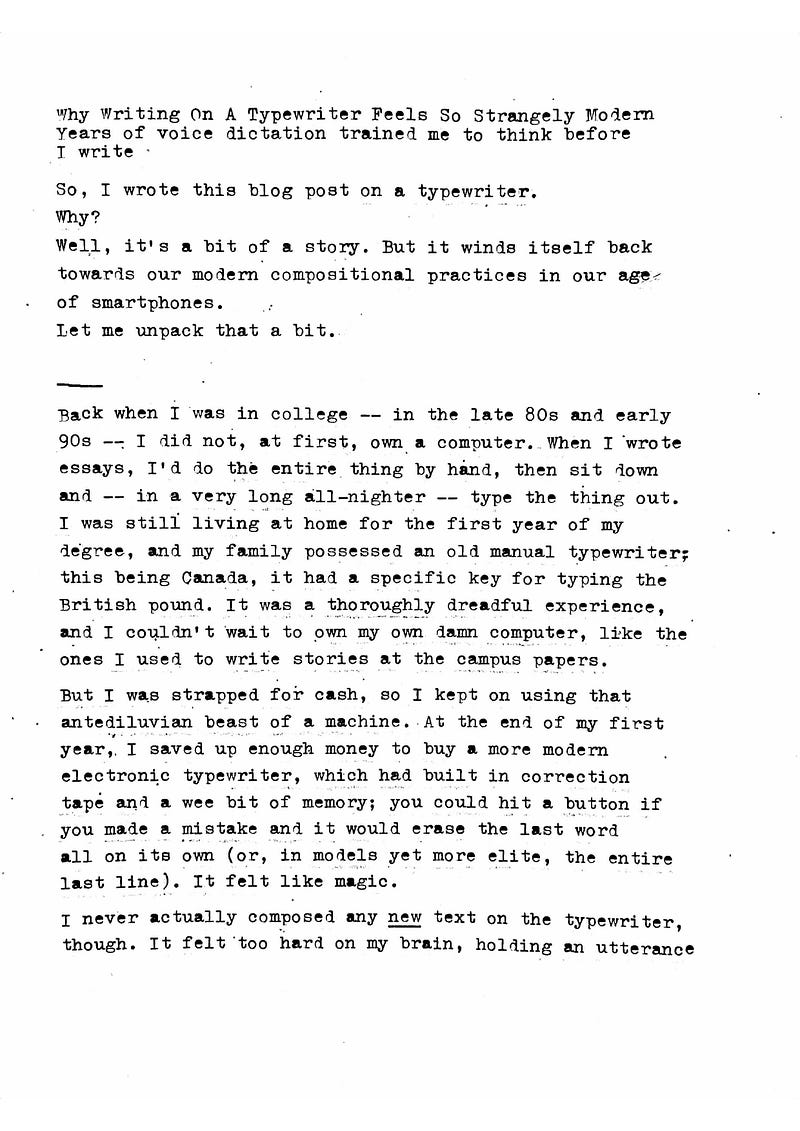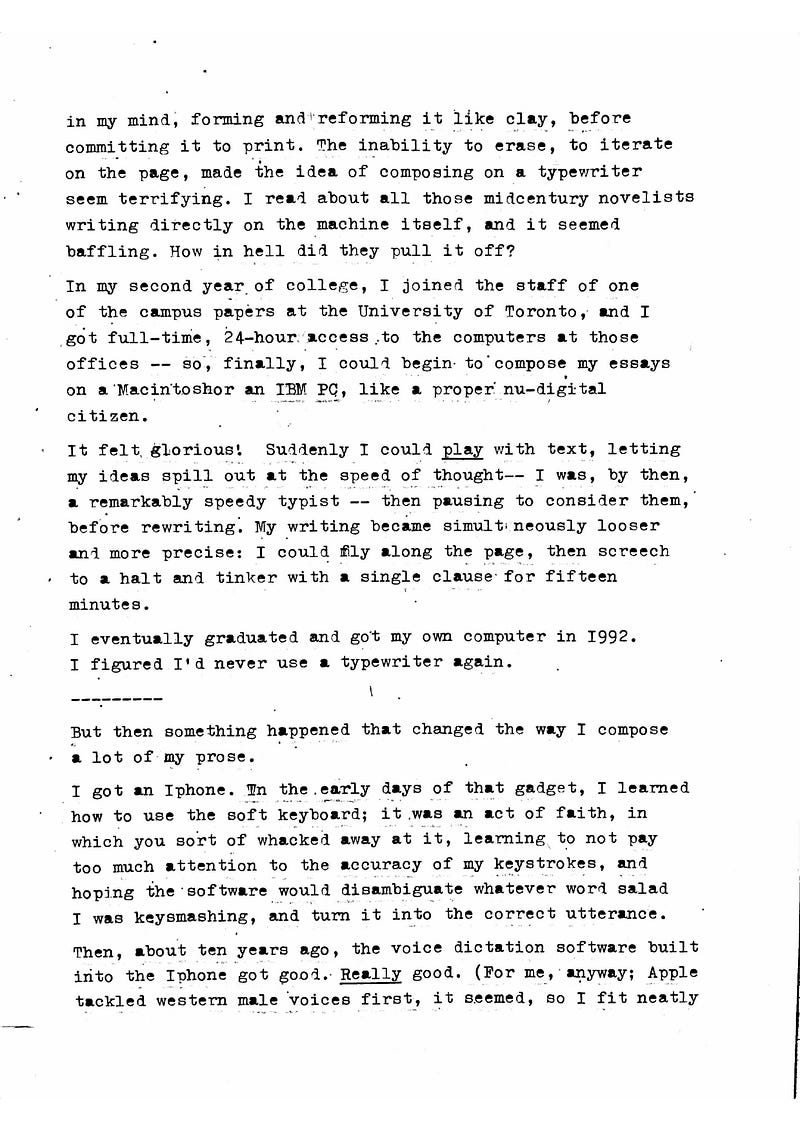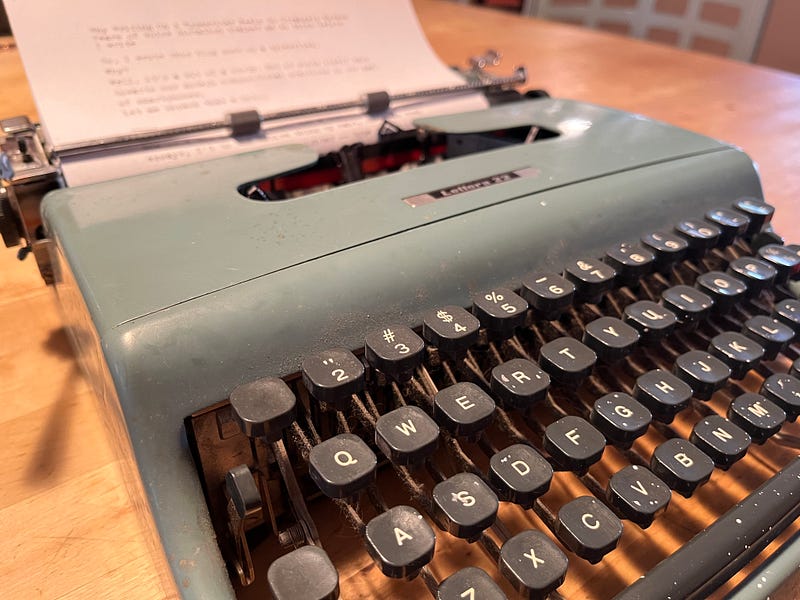Rediscovering the Nostalgic Joy of Writing with a Typewriter
Written on
Chapter 1: The Journey Back to Typewriting
In today’s digital age, the allure of writing on a typewriter may seem unexpected, yet it offers a unique experience that contrasts sharply with contemporary methods. Years of using voice dictation have led me to rethink my writing process.

For those preferring the HTML version, complete with images of my Olivetti portable typewriter, feel free to skip to the end.

My typewriting journey began years ago. In college during the late 80s and early 90s, I didn’t have a computer. Writing essays involved crafting them by hand and then enduring a long night of typing everything on my family’s old manual typewriter, which frustratingly featured a key for the British pound, given our Canadian context.
The experience was less than enjoyable, and I eagerly anticipated the day I could own my own computer, like those I used to draft articles for campus publications. However, financial constraints kept me tethered to that outdated machine. Eventually, I managed to buy a more modern electronic typewriter, complete with correction tape and a small memory feature that felt almost magical.
Despite this upgrade, I never composed new pieces directly on the typewriter. The thought of holding an idea in my mind while battling the limitations of the machine felt daunting. The concept of writing without the ability to revise as I went along was intimidating, particularly when considering the ease with which mid-century writers seemed to compose directly on their typewriters.
In my second year at the University of Toronto, I joined a campus publication that granted me 24-hour access to computers. Finally, I could write my essays on a Macintosh or IBM PC, embracing a new era of digital composition. This transition felt liberating; I could let my ideas flow freely and refine them with ease. My writing became more fluid and precise, allowing me to accelerate my output while also pausing to meticulously edit individual sentences.
By 1992, I had graduated and acquired my own computer, convinced I would never touch a typewriter again. However, the arrival of the iPhone transformed my writing approach. Initially, I struggled with its soft keyboard, but over time, I adapted and found dictation to be far easier than typing. The voice recognition software improved significantly, allowing me to compose emails, social media comments, and outlines effortlessly.
Over the years, I noticed that my dictated outlines often turned out surprisingly well-structured, revealing my ability to articulate complex thoughts swiftly. This cognitive shift meant I was now thinking before I began to dictate, allowing me to pre-iterate ideas before committing them to text.
Curiously, this newfound ability prompted me to revisit the typewriter. I wondered whether the experience of dictation could be compared to the tactile process of old-school typing. I dusted off my Olivetti Lettera 22—a beautifully designed and compact machine—and decided to write this blog post entirely on it.

Chapter 2: The Experience of Typewriting
Writing on a manual typewriter proved to be a delightful experience. The sound of the keys and the physicality of the machine turned writing into a full-bodied activity. My prose felt less convoluted and more straightforward compared to typing on a computer. Surprisingly, I completed the blog post in just a couple of hours, potentially due to the limitations of the typewriter forcing me to simplify my thoughts.
Not being able to incorporate hyperlinks was an unusual adjustment, as my usual writing often engages with online content. The slower pace of typewriting raised questions about whether this was beneficial or detrimental to my thought process.
To further understand the impact of typewriters on modern writing, I decided to delve deeper into the subject.
The first video, "The Modern Typewriter," explores the resurgence of interest in typewriters and their significance in today’s writing landscape.
The second video, "Why I Choose to Use a Typewriter For Writing," offers insight into the personal experiences and motivations behind using typewriters in a digital world.
My typewriter ribbon is nearing its end, but this exercise has sparked a renewed interest in the art of manual writing. Perhaps I will continue to explore this nostalgic form of composition in the future.
If you enjoyed this exploration of typewriting, feel free to hit that “clap” button to show your support!